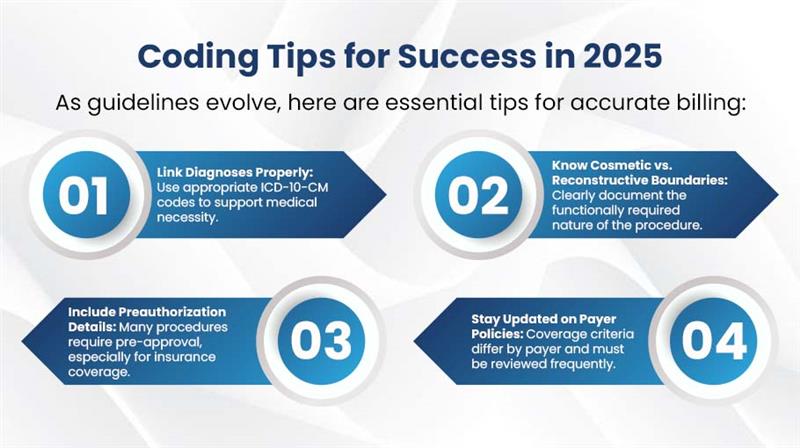Plastic and reconstructive surgery practices require meticulous attention not only to clinical excellence but also to back-end efficiency—especially in billing and coding. With medical coding updates, payer policy changes and evolving compliance regulations, accurately coding procedures is essential for optimized reimbursements.
In 2025, CPT (Current Procedural Terminology) codes for plastic and reconstructive surgery continue to evolve and staying updated can be challenging for busy practices. Many providers now choose to outsource plastic surgery billing services to ensure accurate claims submission fewer denials and faster reimbursements.
Let’s explore the most commonly used CPT codes for plastic and reconstructive surgeries in 2025 along with how Outsourcing Medical Billing Professionals can improve financial outcomes and reduce administrative stress.
Plastic and reconstructive surgery often involve procedures that overlap with cosmetic services which are usually not covered by insurance. It’s vital to distinguish between medically necessary and elective procedures when coding claims. Inaccurate coding can result in denials underpayments or audits.
To maintain efficiency and compliance many surgeons rely on specialized billing and coding services that understand the nuances of plastic surgery procedures and payer guidelines.
Here is a breakdown of frequently used CPT codes in plastic and reconstructive practices:
This code is used for insertion of breast implant. While cosmetic augmentations are typically not reimbursed post mastectomy reconstructions using the code are often covered.
Used for surgical revisions after breast reconstruction procedures. Correct documentation is key to proving medical necessity.
This is commonly used in reconstructive surgeries such as abdominal wall or breast reconstruction. It requires accurate anatomical detail in documentation for successful claim processing.
When combined with panniculectomy (15830), this code is often used for cosmetic purposes but may be reimbursable in certain post-bariatric surgery patients.
A functional nasal surgery code that addresses breathing issues. Clearly distinguishing it from cosmetic rhinoplasty (30400–30450) is crucial for reimbursement.
CPT 67904 is often medically necessary when ptosis interferes with vision. Supporting documentation such as visual field tests is essential.
Commonly used in staged breast reconstruction procedures. Correct sequencing with prior codes (e.g., 11960) is required.
This code is often used when correcting complications like implant displacement, capsular contracture, or aesthetic adjustments.

As guidelines evolve, here are essential tips for accurate billing:
Due to the complexity of these steps, it’s increasingly practical to outsource plastic surgery billing services to trusted specialists who focus solely on compliance and efficiency.
Plastic surgery practices often find themselves struggling to balance patient care, surgical planning and administrative duties. Outsourcing Medical Billing Professionals brings several advantages:
Specialized medical billing companies employ certified coders who stay current with CPT updates, payer policies and compliance rules specifically related to plastic surgery.
Experts can reduce claim denials and underpayments by submitting clean claims the first time, backed by correct modifiers, units and documentation.
Professional billers follow up rigorously with payers, reducing average days in A/R (accounts receivable).
By choosing to outsource plastic surgery billing services, practices can eliminate the needs for hiring and training in-house billing teams, thus saving on payroll software and infrastructure.
Outsourcing frees up time for surgeons and their staff to focus on patient care surgeries and consultations rather than dealing with billing bottlenecks.
Modern billing and coding services go beyond data entry. They include:
These integrated offerings provide full visibility into the revenue cycle allowing practices to optimize performance and forecast income more accurately.
When selecting a medical billing partner plastic surgeons should look for:
In the USA, many leading companies now specialize in niche fields like plastic surgery making it easier to find reliable partners tailored to your specialty.
With the continued rise in plastic and reconstructive procedures precise billing and coding are more important than ever. Staying up to date with the common CPT codes for plastic & reconstructive surgery in 2025 ensures your practice avoids costly errors and compliance risks.
Instead of burdening in-house staff with complex billing processes many successful practices now choose to outsource plastic surgery billing services to professionals who understand the intricacies of the specialty.
Partnering with experienced Outsourcing Medical Billing Professionals not only improves claim accuracy and payment speed but also allows plastic surgeons to focus on delivering exceptional patient care—where their expertise matters most.
Optimize billing, claims and collections with expert RCM support let our professionals handle the process so you can focus on patient care.
